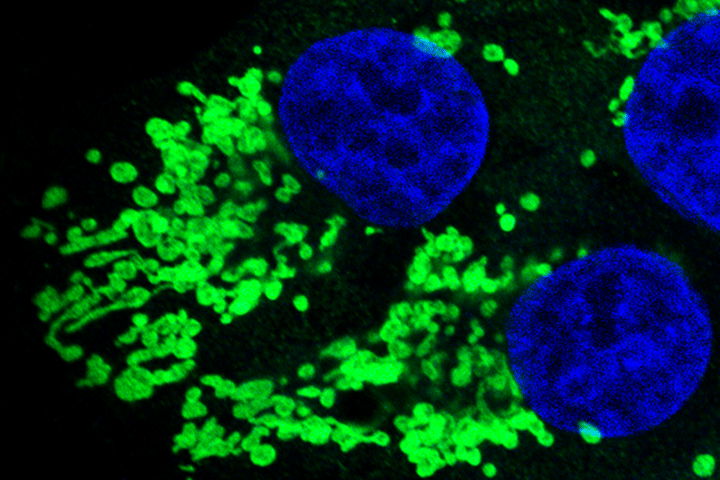Targeting Mutant KRAS with Immunotherapy

By far, KRAS is one of cancer’s most elusive and challenging targets.
KRAS stands for Kirsten rat sarcoma viral oncogene homolog, and it’s one of a group of genes that are part of a complex signaling pathway that helps regulate cell growth, division, survival, and death—all of which are normal cell processes. However, when KRAS is mutated that entire process is disrupted, leading to the uncontrolled cellular growth that defines cancer.
KRAS mutations aren’t rare; they occur in about 25 percent of all human cancers. About 90 percent of pancreas cancers contain KRAS mutations, which would seem to make it an easy target for potentially life-extending precision medicine drugs.
But nothing about KRAS is easy. First, it’s a tiny protein with a very smooth surface. It doesn’t even have the grooves—or deep pockets, as scientists call them—where small-molecule drugs can easily bind to the protein to inhibit, or halt, this uncontrolled cell growth. “What we’re doing is taking a different approach. We want the immune system to do its job of recognizing something foreign . . . ,” which, in this case, are the alterations found in mutant KRAS, explains Dr. Beatriz Carreno, Associate Professor of Pathology and Laboratory Medicine at the Perelman School of Medicine and a member of the Abramson Cancer Center, both at the University of Pennsylvania (Philadelphia). These alterations are commonly referred to as neoantigens, she adds.
Carreno is co-leader of a team focusing on immunotherapy and KRAS mutations that also includes Dr. Elizabeth Jaffee (co-leader) and Dr. Robert Vonderheide (leader.) Jaffee is Deputy Director of The Sidney Kimmel Comprehensive Cancer Center and Professor of Oncology at Johns Hopkins (Baltimore) and Vonderheide is Director, Abramson Cancer Center, Perelman School of Medicine, and the John H. Glick Abramson Cancer Center Professor at Penn. Each of the team members are international leaders in the research and development of immune-based cancer treatments.
The team was awarded second-round funding from the Pancreatic Cancer Collective’s “New Therapies Challenge Grants” to continue their work, started in the first round of funding, to develop vaccines aimed at triggering mutant KRAS immune responses in patients with resected pancreatic cancer.
Their work is complex and brings together necessary expertise in diverse areas, including bioinformatics, immunology, biochemistry, and cell biology. The ultimate goal, the researchers say, is to develop a cellular therapy that exploits novel cell engineering to manufacture highly selective anticancer T cells on an individual patient basis.
Adoptive Cellular Therapy
The overarching term for this type of treatment is called “adoptive cellular therapy.” Basically, it’s a type of therapy that uses the cells of our own immune system to destroy cancer. Sometimes, if the body’s T cells recognize a tumor as foreign, those T cells can be increased to much larger numbers to better fight cancer. But, depending on some very complex factors, not all T cells recognize tumors as foreign. Or sometimes, patients just don’t have enough anticancer T cells in the first place.
In that case, doctors take a different adoptive cellular therapy approach called engineered T cell receptor (TCR) therapy. Here, doctors take T cells and fit them with new T cell receptors that help those cells identify cancer antigens. Carreno likens the team’s approach to a type of treatment now offered for some lymphoma and leukemia patients called CAR T cell therapy. “What we’re doing is similar; however, in our study, we are engineering patients’ T cells with a receptor that recognizes mutant KRAS neoantigens,” she explains.
Early Work with KRAS Sequences Show Promise
In the first round of funding, the team identified specific mutant KRAS sequences that can be recognized by T cells. Then, using these mutant KRAS sequences, they vaccinated two groups of people: healthy individuals and pancreatic cancer patients with mutant KRAS tumors. From these individuals, they then isolated a series of TCRs that enable T cells to home in on cancer cells expressing mutant KRAS.
With the success of their preclinical work, the team is researching two novel vaccines in the clinic, aimed at triggering mutant KRAS immune responses in patients with surgically removed pancreatic cancer. The plan, says Carreno, is to isolate the most promising TCR identified and conduct a clinical trial of engineered TCR T cell therapy for patients with metastatic pancreatic cancer. The team is currently working on two types of vaccines: a dendritic cell vaccine, which is a type of white blood cell vaccine, and a peptide vaccine. Peptides are short chains of amino acids. The second-round funding will allow the team to continue vaccination and develop a mutant KRAS TCR therapy.
Carreno has spent much of her career in the research and development of personalized cancer vaccines for melanoma. She is considered an expert in the study of neoantigens, which arise in tumors as a result of protein alterations and are recognized as foreign by a patient’s immune system.
“It wasn’t really that long ago that melanoma was one of those cancers that there weren’t a lot of good therapy options for,” she says. “But look how far treatment has progressed. There have been major advances in the last 10 years alone, in which immunotherapy has led to dramatic improvements in survival for some melanoma patients.
“I am hopeful that the same thing can happen in pancreatic cancer, and I am very excited to be part of this team with Bob (Vonderheide) and Liz (Jaffee). Pancreatic cancer is a challenging disease, but we, as well as other researchers, are finding some answers. There is no panacea, but immunotherapy can be very powerful.”





